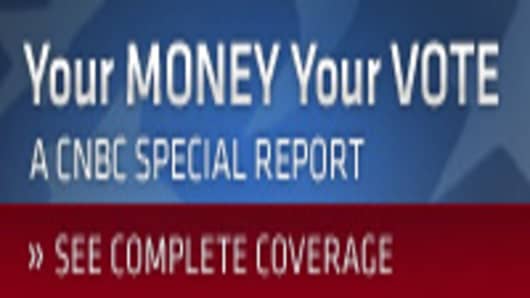With the Bush tax cuts of a decade ago set to expire at the end of the calendar year, the historically divisive issue of taxes is front and center in the 2010 midterms .
Witness the recent jousting match between President Obama and Republican House leader John Boehner of Ohio, and Senate Majority Leader Mitch McConnell's follow-up move.
Despite a move by Congressional Democrats to delay action on taxes until after the election, such jousting will continue.
The tax picture is also more complicated this year. Cash-strapped states and municipalities are raising taxes (and/or fees) to close budget gaps, so voters are already sensitive to the issue.
In addition, the federal tax question extends beyond the usual suspects (income, estate, dividends, capital gains) to a new instrument—the Value-Added Tax , or VAT, a national sales tax, standard in Europe and common in other regions.
Big-Ticket Items
The hot-button issue is what happens with taxes on income—and, to a somewhat lesser extent, estates, dividends and capital gains.
President Obama and House Majority Leader John Boehner sparred
over tax relief for the middle class and wealthy after the Labor Day holiday, setting the tone for debate in the coming weeks. McConnell soon called for a tax freeze, saying he has ample Democratic support in the Senate.
What's more, the tax cut debate has also already had its share of surprising salvos from both sides of the political aisle.
Obama's former budget director Peter Orszag recommended a complete extension of the Bush cuts following his resignation in July, while President Reagan's former budget chief David Stockman said the cuts--both then and now--are unaffordable.
Under the sunsetting of Bush tax cuts, the existing six percentile brackets for income (10, 25, 25, 28, 33, 35) with be consolidated into to five with mostly higher rates (15, 28, 31, 36, 39.8). Income levels have yet to be determined.
The GOP wants all the cuts extended for at least a year, preferably two, while Obama and the Democrats are committed to raising rates on the top two income brackets, affecting incomes starting at $200,000 (individuals) and $250,000 (couples), and sparing the middle class.The other taxes will revert to pre-2003 levels, unless legislation is enacted.
The Democratic plan would cost the government $2.9 trillion in lost tax revenue over a ten-year period; the Republican plan would cost $700 billion more.
Those on long-term capital gains will rise from 15 percent to 20 percent, and 0 percent to 10 percent, depending on income levels. Dividends will go from 15 percent to 28 percent in most cases.
Congress is already considering a law to reinstate the inheritance tax this year. Under the Bush plan it was eliminated for 2010 but will return in 2011, carrying a $1-million exemption and a maximum rate of 55 percent.
VAT and AMT?
There’s also growing speculation that the Obama administration will eventually seek the imposition of a VAT —probably at a 10-percent level—to help pay down the federal deficit.
Ten percent is low by international standards, but many nations do not have state-level sales taxes. In states with high existing sales taxes, like California, Oregon, New Jersey, Texas and New York, a VAT could resonate more than in others.
The highly unpopular—yet revenue rich—Alternative Minimum Tax may also pop up in campaign speeches and debates here and there, but there are already adjustments in place for 2010 to limit its impact on the middle class.
Taxes are more than a ideological issue at this point, as both Republicans and Democrats are looking for ways to offset spending initiatives and reduce the budget deficit and national debt.
Taxing Around The Edges
Other tax initiatives will probably show up in budget proposals, as was the case in 2009, when the President's team proposed a variety of measures.
Obama’s proposal, which was rebuffed by Congress, would cap the mortgage interest deduction, effectively eliminating it for individuals making more than $200,000 a year and joint-return fillers with more than $250,000.
Right now, taxpayers can deduct the interest paid on first and second mortgages up to $1,000,000 and up to $100,000 on home equity loans.
The Obama plan also called for caps or reductions on itemized deduction levels (28 percent vs. by 35 percent of their federal tax bill) for people in the two highest tax brackets.
Corporate Front
Both parties have turned up the heat in this area in the past couple weeks.
The Senate, following the House, approved a $30-billion package of tax credits and cuts for small business.
The President is pushing a $100-billion proposal to permanently extend research and development tax credits for businesses.
He even left the door open for a payroll tax holiday during his recent town hall meeting on CNBC.com. Somewould settle for a cut in the rate.
Tax hikes are also in the air. Senate Democrats are trying to revive anearlier bill to raise taxeson energy companies and hedge fund managers. In the latter category, the proposal is to raise the rate on carried interest, such that managers fees and commissions are taxed as ordinary income--a proposal the Obama heartily endorsed in his town hall appearance.
State Policies A Factor
The federal tax burden isn't the only issue for candidates and voters. In some states, tax cuts and increases are also part of the landscape.
Oregon raised income tax rates , while New Jersey and Rhode Island lowered one or another in 2010. A dozen states added tax brackets covering the highest incomes in 2009.
Arizona and Kansas increased their sales taxes in 2010, while Hawaii, New Mexico, New York, South Carolina and Utah jacked taxes on cigarettes.
These tax hikes and a myriad of fee increases—from motor vehicle and gun licenses to college tuition—will almost certainly make voters more sensitive and attentive to tax talk on the campaign trail.




